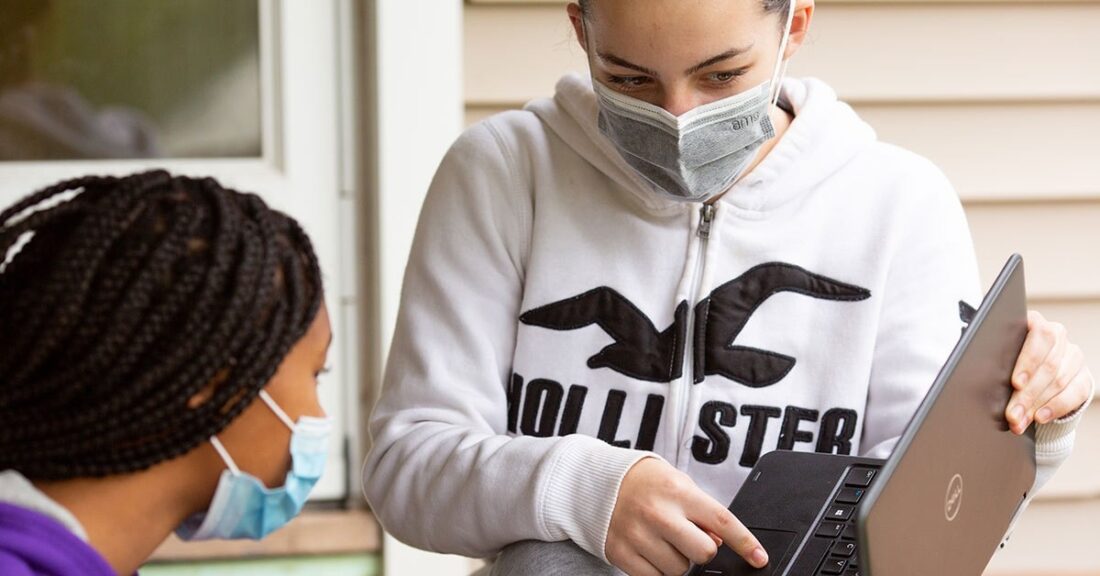Bolstering Learning in a Pandemic
In Georgia, New Report Informs State Spending to Advance Academic Recovery

Photo by Allison Shelley for EDUimages
The Georgia Department of Education has announced new funding aimed at helping students recover from a year of disrupted learning due to the COVID-19 pandemic. It’s a move backed by data indicating that the public health crisis has substantially slowed student progress in certain Atlanta-area school districts and exacted a greater toll on students in low-income families and students of color.
The Georgia Policy Labs (GPL), a grantee of the Annie E. Casey Foundation based at Georgia State University, analyzed student testing data in three Atlanta-area school districts to create a detailed snapshot of the pandemic’s effect on academic progress.
GPL’s review utilized formative tests, which are designed to capture what students know while they are still in the process of learning something. This approach enabled GPL to work quickly and issue its final report — complete with timely recommendations — in May 2021.
“There’s such a long lag time for standardized test scores to come back to the districts and researchers,” explains Chris Kingsley, a senior associate with the Foundation’s Research, Evaluation and Data team. “In this case, GPL was uniquely positioned to use formative tests and turn the data around quickly to inform policymakers’ decisions.”
Responses to the Pandemic’s Effect on Kids Academic Achievement
The pandemic substantially slowed students’ expected trajectory of achievement with wide variation by academic subject, grade level and school district, according to the report. Students who had more remote learning also had less academic growth than students who returned to the classroom.
The GPL team proposed ways to help students catch up academically: intensive tutoring for kids who experienced the largest setbacks; longer school days during the academic year; 20-student caps on classes; and school breaks — including summer break — filled with academic programming. Overall, the report stressed the importance of employing data-driven, proven strategies at every turn.
GPL shared its findings widely — with school partners, other school systems, the state Department of Education and education stakeholders. Local and national media covered the report and its recommendations extensively, and school districts cited GPL’s research when outlining their academic recovery approach in state applications for American Rescue Plan Act funding.
Two months after the report’s release, Georgia announced new support — $85 million in grants made possible by the federal American Rescue Plan — aimed at helping students get their learning back on track. The Building Opportunities in Out-of-School Time program funds statewide organizations operating year-round as well as local community-based organizations offering afterschool and summer learning programs. The approach prioritizes students who suffered the largest losses during the pandemic, including kids from low-income households, youth with disabilities and those who spent the majority of the prior academic year learning remotely.
“It’s rare in education to see research like this have such an immediate impact on decision making,” says Rubye Sullivan, a Casey senior associate who focuses on education at the Atlanta Civic Site.
Building Strong Data-Sharing Partnerships
Beyond the report, GPL has gathered two decades of education data and formed data-sharing partnerships with state and local agencies working on a range of issues, from child care to adult education. The Casey Foundation has funded GPL, in part, because of its capacity to cross bureaucratic boundaries, analyze data and craft broad policy recommendations.
In its K‑12 education work, GPL has a singular focus: to provide its partner school systems with timely policy recommendations that will benefit children and families.
“We always try to focus on policy questions where the districts have policy options at their disposal,” explains Maggie Reeves, GPL’s senior director. “We’re always listening, and our researchers are at our partners’ fingertips to attack problems that really matter to them right now. With the historic data we have, we can use it basically at a moment’s notice if the districts approve.”
Explore a resource hub for supporting students who disengaged from school during the pandemic
Read the Foundation’s report on addressing the pandemic’s effects on children and families






